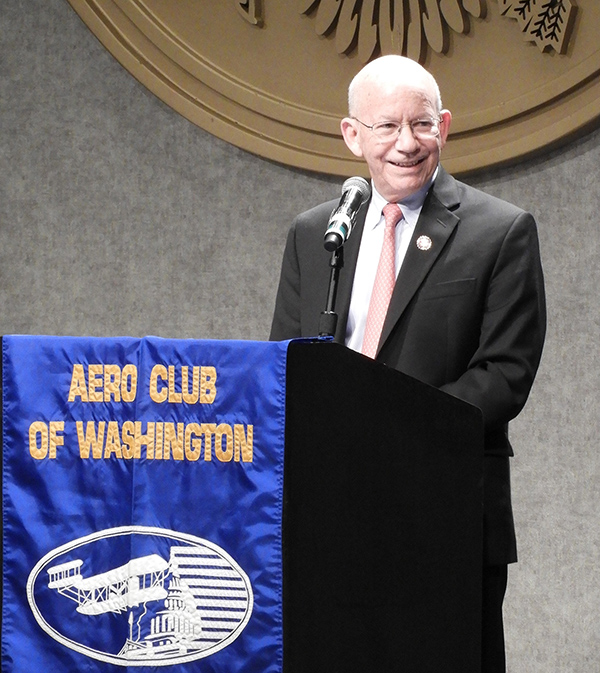
By Michael J. Schoen
Never again will the FAA be impacted by a government shutdown, if the recently-elected head of the House Transportation & Infrastructure Committee has his way. This was Chairman Peter DeFazio’s key message on Friday, February 8th, during a wide-ranging speech to the Aero Club of Washington, DC.
Addressing a ballroom packed with 350 people from more than a dozen major aviation trade groups, companies, and other organizations, DeFazio announced that just hours earlier, he and House Aviation Subcommittee Chairman Rick Larsen had introduced the Aviation Stability Act of 2019 (H.R. 1108). This was met with exuberant cheers from the delighted (but unsurprised) crowd.
Promising that the bill would be promptly marked up by his committee, the Chairman described it as a “simple” piece of legislation. One that would draw on the Airport & Airway Trust Fund to sustain “full operation [of all] . . . FAA functions” in the event of future shutdowns – without any action by Congress. He was careful to add that the funds would be repaid once the government reopened.
The Chairman went on to point out that the latest shutdown’s impact on the FAA was “very disruptive” to the “critical” aviation infrastructure of the United States, and must be prevented from happening again. Yet whether this is actually possible remains to be seen, with another potential shutdown looming on February 16th.
Drone Strikes Inevitable; Airline Seats Too Small.
Moving to other topics on his agenda, DeFazio addressed subjects such as the Passenger Facility Charge, urban air mobility, “drones,” and counter-drone technology. He warned that, in light of the increasing number of incidents involving drones at and around airports, it’s “only a matter of time” before there’s a serious drone strike. He described such an event as being potentially “[far] worse than the impact of a large bird,” according to information provided to him by the FAA. The Chairman even went so far as to say that a drone strike could equal the fatal engine failure experienced by Southwest Airlines Flight 1380, in April of 2018. He promised, however, that there will be “vigorous oversight” of unmanned aircraft during his leadership of the House Transportation and Infrastructure Committee.
Chairman DeFazio also spoke of the need to regulate the domestic airline industry in a way that balances the interests of carriers and their passengers. For example, in talking about airplane seats, he noted that “most American’s don’t fit anymore,” stating that airlines “can’t keep cramming them in.” He emphasized that seating must allow passengers to evacuate within 90 seconds. Yet on the other hand, he said, Congress cannot mandate that airlines provide their passengers with comfortable seats. For that, passengers may have to pay extra – even if only for “pseudo” comfort, he joked.



